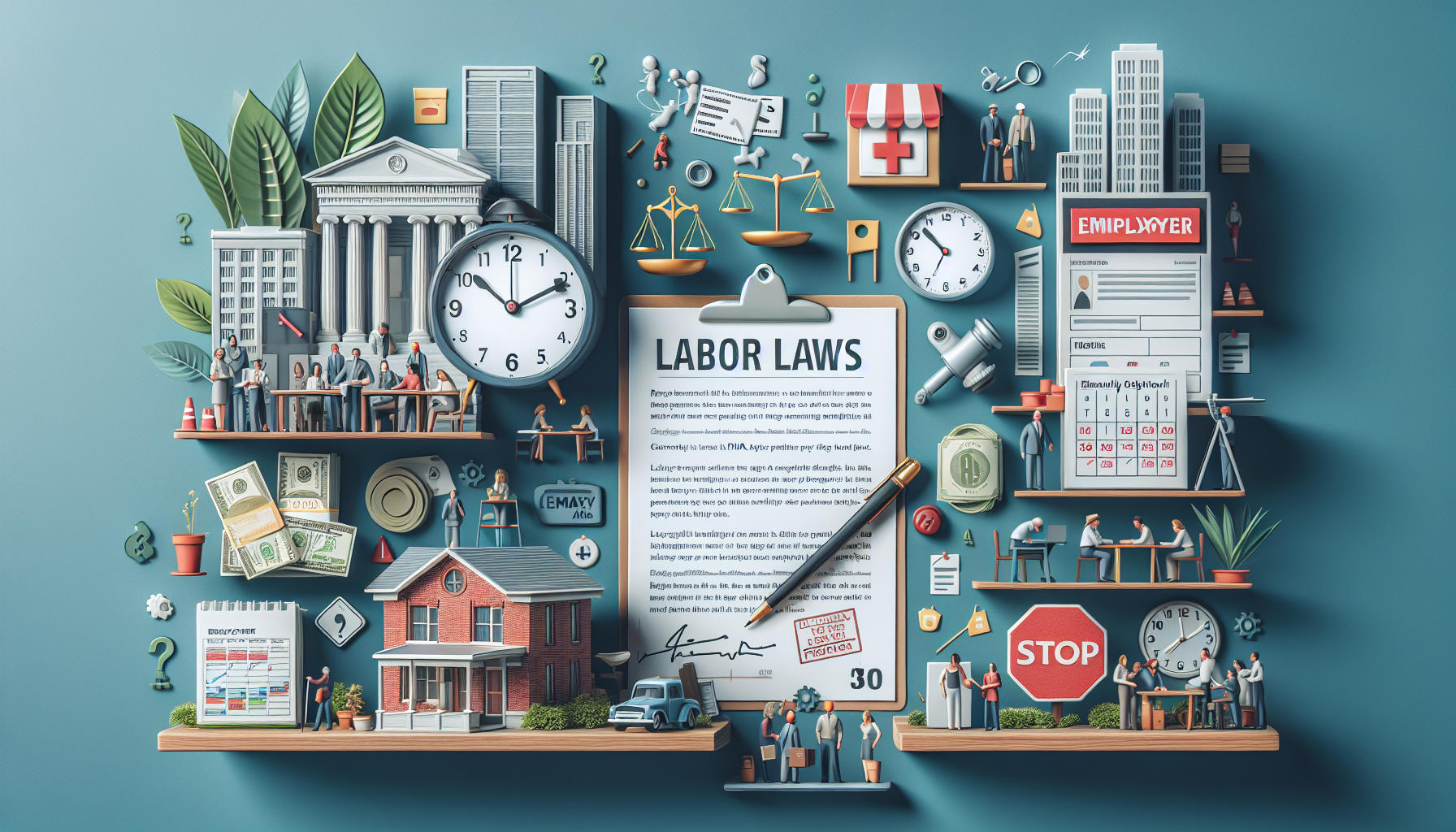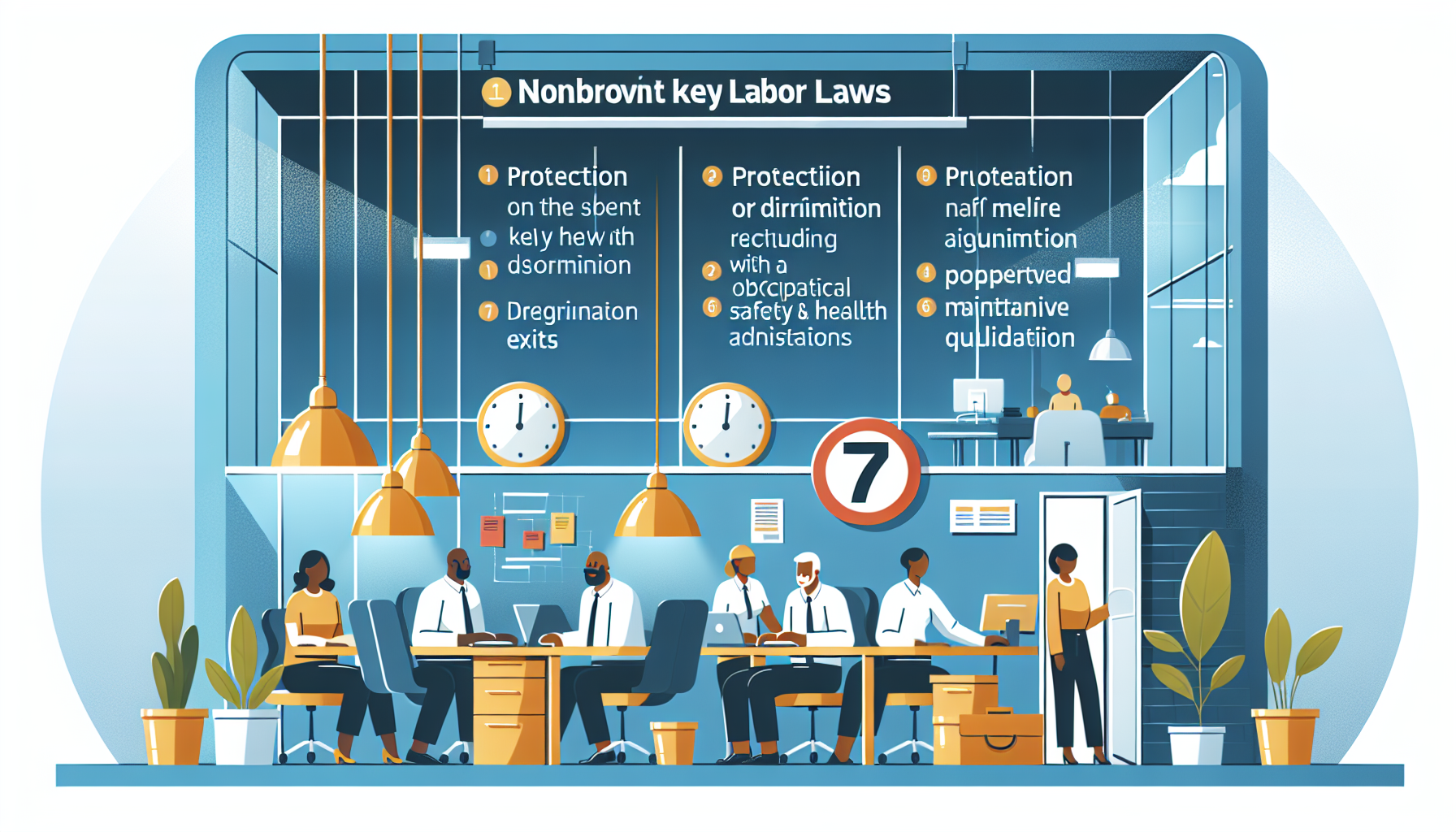Navigating the world of labor laws can be tricky for nonprofits. Many organizations worry about compliance, fearing hefty fines or legal troubles. It’s crucial to understand that these laws are not just red tape; they protect both employees and the organization. By knowing what laws apply, nonprofits can create a better workplace and avoid costly mistakes. This post will break down essential labor laws that every nonprofit should know.
- Learn what labor laws are and their significance.
- Understand why these laws matter specifically for nonprofits.
- Discover key labor laws that affect nonprofit operations.
- Explore the consequences of non-compliance.
- Get resources to help your nonprofit stay informed.
Understanding the Basics of Labor Laws
Labor laws are rules that govern how employers and employees interact in the workplace. They cover various topics, including wages, working hours, and employee rights. These laws aim to ensure fair treatment and safe working conditions. For nonprofits, understanding labor laws is vital, as they often operate with limited resources and staff. Ignoring these laws can lead to serious consequences, from fines to damage to reputation.
Labor laws vary by state and can be complicated. However, knowing the basics helps nonprofits navigate their responsibilities. Organizations must stay updated on changes to these laws to maintain compliance and foster a positive work environment.
What are Labor Laws?
Labor laws are regulations set by federal, state, and local governments to protect workers’ rights. They cover a wide range of issues, such as minimum wage, overtime pay, workplace safety, and discrimination. For example, the Fair Labor Standards Act (FLSA) establishes minimum wage and overtime standards for employees.
These laws exist to ensure that all workers are treated fairly and have a safe environment. Nonprofits, like any other employer, must adhere to these laws. Failure to do so can result in legal action, fines, or loss of funding.
Why Do Labor Laws Matter for Nonprofits?
Labor laws are especially important for nonprofits because they often rely on volunteers and staff to fulfill their missions. Nonprofits must ensure that they treat all individuals fairly and ethically. Adhering to labor laws builds trust with employees, volunteers, and donors, which is crucial for long-term success.
Moreover, compliance with labor laws helps protect the organization from legal issues. Nonprofits that ignore these regulations risk damaging their reputation and losing support. By understanding and following labor laws, nonprofits can create a positive work culture and focus on their mission without unnecessary distractions.
Do Nonprofits Have to Follow Labor Laws?
Yes, nonprofits must follow labor laws just like any other employer. Many people mistakenly think that because nonprofits operate for charitable purposes, they are exempt from these regulations. This misconception can lead to serious issues for organizations. Nonprofits often employ staff and rely on volunteers, making it essential to comply with labor laws to protect everyone involved.
Ignoring these laws can result in fines, lawsuits, or loss of funding, which can severely impact a nonprofit’s ability to serve its community. Therefore, understanding labor laws is crucial for nonprofits to operate effectively and ethically.
Common Misconceptions About Nonprofits and Labor Laws
One common misconception is that nonprofits do not have to pay minimum wage or overtime. This is false; the Fair Labor Standards Act (FLSA) applies to most nonprofits, meaning they must adhere to wage laws. Another myth is that volunteers are not covered by any labor laws. While volunteers have different protections, nonprofits must ensure they are treated fairly and safely.
Many also believe that small nonprofits are exempt from labor laws. However, even small organizations with employees must comply with applicable regulations. It’s vital for nonprofits to educate themselves about these misconceptions to avoid potential pitfalls.
Legal Obligations for Nonprofits
Nonprofits have several legal obligations regarding labor laws. They must provide a safe workplace, comply with wage and hour laws, and ensure that employees are not discriminated against based on race, gender, or disability. The Occupational Safety and Health Administration (OSHA) sets standards for workplace safety that all employers, including nonprofits, must follow.
Additionally, nonprofits must maintain accurate records of employee hours and wages. This ensures compliance with laws such as the FLSA. Failure to meet these obligations can lead to investigations and penalties. By understanding and fulfilling their legal responsibilities, nonprofits can create a supportive environment for their staff and volunteers.

Key Labor Laws Nonprofits Must Follow
Nonprofits must be aware of several key labor laws to ensure compliance and protect their employees. Understanding these laws is essential for creating a fair and safe work environment. Here are some of the most important regulations that nonprofits should follow:
- Fair Labor Standards Act (FLSA)
- Family and Medical Leave Act (FMLA)
- Americans with Disabilities Act (ADA)
- Occupational Safety and Health Administration (OSHA) Regulations
- Equal Employment Opportunity (EEO) Laws
Each of these laws plays a significant role in how nonprofits operate, affecting everything from wages to workplace safety.
Fair Labor Standards Act (FLSA)
The Fair Labor Standards Act (FLSA) is one of the most critical labor laws that nonprofits must follow. It establishes standards for minimum wage, overtime pay, and child labor. Under the FLSA, most employees must receive at least the federal minimum wage, which is currently $7.25 per hour. This law ensures that workers are fairly compensated for their time and effort.
Nonprofits often operate on tight budgets, but they cannot overlook the importance of complying with the FLSA. Understanding which employees are classified as exempt or non-exempt is crucial for proper payroll management. Misclassification can lead to significant legal issues and financial penalties.
Minimum Wage Requirements
Under the FLSA, nonprofits must adhere to minimum wage requirements set by federal and state laws. The federal minimum wage is $7.25 per hour, but many states have established higher rates. Nonprofits must pay their employees at least the minimum wage applicable in their state.
It’s essential for organizations to stay informed about changes in wage laws, as these can vary significantly. Some localities even have their own minimum wage rates that exceed state levels. By ensuring compliance with these wage requirements, nonprofits can maintain a positive reputation and foster trust among employees and supporters.
Overtime Pay Regulations
The Fair Labor Standards Act (FLSA) also includes specific regulations regarding overtime pay. Nonprofits must pay eligible employees time and a half for any hours worked over 40 in a workweek. This rule applies to non-exempt employees, who are typically hourly workers. Understanding which employees fall into this category is essential for compliance.
Nonprofits should maintain accurate records of employee hours to ensure proper compensation. Failing to pay overtime can lead to legal issues, including lawsuits and fines. Organizations must regularly review their payroll practices to avoid these pitfalls and ensure that all employees are compensated fairly for their work.
Family and Medical Leave Act (FMLA)
The Family and Medical Leave Act (FMLA) is another important law that nonprofits need to understand. This federal law allows eligible employees to take up to 12 weeks of unpaid leave for specific family and medical reasons without fear of losing their job. Reasons for taking leave can include the birth of a child, adoption, or serious health conditions affecting the employee or their family members.
Nonprofits must comply with the FMLA if they have 50 or more employees within a 75-mile radius. Understanding this law helps organizations support their staff during critical life events, fostering a positive workplace culture.
Employee Eligibility
To qualify for FMLA leave, employees must meet certain eligibility criteria. They need to have worked for their employer for at least 12 months and logged at least 1,250 hours in the past year. Additionally, the FMLA only applies to organizations with 50 or more employees.
It’s crucial for nonprofits to keep track of employee hours and tenure to determine eligibility accurately. By adhering to these guidelines, nonprofits can ensure that they provide necessary support to their employees while complying with federal regulations.

Leave Entitlements
Under the Family and Medical Leave Act (FMLA), employees are entitled to take up to 12 weeks of unpaid leave for specific reasons without losing their job. These reasons include the birth or adoption of a child, caring for a seriously ill family member, or dealing with a personal health issue. During this time, employees can maintain their health benefits, ensuring they have access to necessary medical care.
Nonprofits must clearly communicate these entitlements to their employees. Organizations should have a written policy outlining FMLA leave procedures to ensure that everyone understands their rights. This transparency helps build trust and fosters a supportive work environment.
Americans with Disabilities Act (ADA)
The Americans with Disabilities Act (ADA) is a crucial law that protects individuals with disabilities from discrimination in the workplace. Nonprofits must comply with the ADA, which requires them to provide reasonable accommodations for employees with disabilities. These accommodations can include modified work schedules, accessible facilities, or assistive technology.
Understanding the ADA is essential for nonprofits, as it promotes an inclusive environment. By complying with this law, organizations can attract diverse talent and demonstrate their commitment to equality and fairness in the workplace.
Reasonable Accommodations
Reasonable accommodations under the ADA are adjustments made to help employees with disabilities perform their jobs effectively. Examples include providing specialized equipment, allowing flexible work hours, or modifying job duties. Nonprofits must engage in an interactive process with employees to determine appropriate accommodations.
It’s essential for organizations to document these discussions and decisions to ensure compliance with the ADA. By proactively addressing the needs of employees with disabilities, nonprofits can create a more inclusive workplace and enhance employee satisfaction and productivity.
Protecting Employees from Discrimination
Nonprofits must comply with laws that protect employees from discrimination based on race, color, religion, sex, national origin, age, disability, or genetic information. The Equal Employment Opportunity Commission (EEOC) enforces these laws, ensuring that all employees have equal opportunities in hiring, promotions, and other employment practices.
To foster a fair workplace, nonprofits should implement anti-discrimination policies and provide training to staff. This not only helps in maintaining compliance but also promotes a culture of respect and inclusion. By actively working against discrimination, organizations can enhance their reputation and build a more diverse workforce.
Occupational Safety and Health Administration (OSHA) Regulations
The Occupational Safety and Health Administration (OSHA) sets and enforces standards to ensure safe and healthy working conditions. Nonprofits are subject to OSHA regulations, which require them to provide a workplace free from recognized hazards. This includes maintaining equipment, providing safety training, and ensuring proper emergency procedures are in place.
Nonprofits should regularly assess their work environments to identify potential hazards. By prioritizing safety, organizations can protect their employees and minimize the risk of accidents or injuries.
Workplace Safety Standards
Workplace safety standards established by OSHA cover a wide range of topics, including fall protection, hazard communication, and personal protective equipment. Nonprofits must comply with these standards to create a safe environment for their employees.
Regular safety training and drills are essential to ensure everyone knows how to respond to emergencies. Additionally, nonprofits should maintain clear safety protocols and encourage employees to report unsafe conditions. By emphasizing safety, organizations not only comply with regulations but also demonstrate their commitment to employee well-being.

Reporting and Recordkeeping Requirements
Nonprofits are required to maintain accurate records related to employee hours, wages, and safety incidents. The Fair Labor Standards Act (FLSA) mandates that employers keep detailed payroll records, including the hours worked by each employee and their rate of pay. Additionally, OSHA requires organizations to record workplace injuries and illnesses.
Proper recordkeeping not only ensures compliance with labor laws but also helps nonprofits track trends and address potential issues proactively. Regular audits of these records can help identify discrepancies and improve organizational practices, ultimately fostering a safer and more compliant workplace.
Equal Employment Opportunity (EEO) Laws
Equal Employment Opportunity (EEO) laws prohibit discrimination in the workplace based on race, color, religion, sex, national origin, age, disability, or genetic information. Nonprofits must understand and comply with these laws to create an equitable work environment.
This includes implementing fair hiring practices, providing equal opportunities for promotions, and ensuring that all employees are treated with respect. By adhering to EEO laws, nonprofits can attract diverse talent and enhance their organizational culture, which ultimately supports their mission and goals.
Preventing Workplace Discrimination
To effectively prevent workplace discrimination, nonprofits should establish clear policies and procedures. Training programs on diversity, equity, and inclusion can educate employees about their rights and responsibilities. Creating a safe reporting mechanism for discrimination complaints encourages employees to speak up without fear of retaliation.
Additionally, nonprofits should regularly review their hiring and promotion practices to ensure fairness. By actively promoting an inclusive workplace, organizations not only comply with EEO laws but also foster a positive environment where all employees feel valued and respected.
Hiring Practices Nonprofits Should Follow
Nonprofits should adopt fair hiring practices to ensure compliance with labor laws and promote diversity. This includes creating clear job descriptions, using unbiased language in postings, and implementing structured interview processes. By standardizing interviews, organizations can reduce the risk of discrimination and ensure that all candidates are evaluated based on their qualifications.
Additionally, nonprofits should conduct background checks and reference checks consistently for all applicants. Training hiring managers on EEO laws and unconscious bias can further enhance fairness in the hiring process. By prioritizing equitable hiring practices, nonprofits can build a diverse workforce that reflects the communities they serve.
National Labor Relations Act (NLRA)
The National Labor Relations Act (NLRA) protects employees’ rights to organize and engage in collective bargaining. This law applies to most private-sector employers, including nonprofits, and ensures that employees can join together to discuss workplace issues without fear of retaliation.
Understanding the NLRA is crucial for nonprofits, as it helps maintain a positive relationship between management and staff. By respecting employees’ rights to organize, nonprofits can foster a collaborative environment that encourages open communication and problem-solving.
Employees’ Rights to Organize
Under the NLRA, employees have the right to form or join unions, engage in collective bargaining, and participate in other concerted activities for mutual aid or protection. This means that employees can discuss working conditions, wages, and benefits without fear of employer retaliation.
Nonprofits should be aware of these rights and create an environment that supports open dialogue. Encouraging employees to voice their concerns can lead to improved workplace morale and productivity. By respecting employees’ rights to organize, nonprofits can strengthen their organizational culture and promote a sense of community among staff.

Collective Bargaining
Collective bargaining is the process through which employees negotiate with their employer regarding wages, benefits, and working conditions. Under the National Labor Relations Act (NLRA), employees have the right to engage in collective bargaining through their chosen representatives. This process allows workers to voice their concerns and advocate for improvements in their workplace.
Nonprofits should recognize the importance of collective bargaining and be prepared to engage in negotiations with employee representatives. By fostering a collaborative relationship with unions or employee groups, nonprofits can create a more harmonious workplace and address issues before they escalate.
State-Specific Labor Laws
In addition to federal labor laws, nonprofits must comply with state-specific labor laws that may impose additional requirements. Each state has its own regulations regarding minimum wage, overtime, leave entitlements, and workplace safety. Nonprofits operating in multiple states must be aware of these variations to ensure compliance.
Understanding state-specific laws is essential, as noncompliance can lead to legal repercussions and financial penalties. Organizations should regularly review local regulations and consult legal experts to stay informed about any changes that may affect their operations.
Importance of Knowing Local Regulations
Knowing local regulations is crucial for nonprofits to operate effectively and ethically. Local laws can differ significantly from state and federal laws, impacting everything from hiring practices to workplace safety standards. For instance, cities may have higher minimum wage requirements or specific health and safety regulations.
By staying informed about local regulations, nonprofits can avoid potential legal issues and foster a positive work environment. Regular training and updates for staff on these laws will help ensure compliance and promote a culture of accountability within the organization.
Examples of State Variations
State variations in labor laws can significantly impact how nonprofits operate. For example, California has a minimum wage that is higher than the federal standard, currently set at $15.50 per hour, with plans for further increases. Additionally, California requires employers to provide paid sick leave, which is not mandated at the federal level.
In New York, the law mandates that employers provide employees with at least 12 weeks of paid family leave, which is more generous than the federal Family and Medical Leave Act (FMLA). Meanwhile, states like Texas have fewer regulations, allowing for more flexible employment practices but still requiring adherence to federal laws.
Understanding these state variations is crucial for nonprofits to ensure compliance and avoid penalties. Organizations should regularly review local laws and consult resources or legal experts to navigate the complexities of state-specific regulations effectively.

Consequences of Not Following Labor Laws
Failing to comply with labor laws can lead to serious consequences for nonprofits. These repercussions can affect not only the organization’s financial standing but also its reputation in the community. Understanding the potential outcomes of non-compliance is essential for nonprofits to operate effectively and ethically.
Legal Ramifications
Nonprofits that do not adhere to labor laws may face significant legal ramifications. This can include fines, penalties, and lawsuits from employees or regulatory agencies. For instance, violations of the Fair Labor Standards Act (FLSA) can result in back pay claims, where organizations must compensate employees for unpaid wages or overtime.
Additionally, if a nonprofit is found guilty of discrimination or harassment, it could face lawsuits that lead to costly settlements. Legal battles can drain resources and divert attention from the organization’s mission. Therefore, understanding and following labor laws is crucial to avoid these legal pitfalls.
Impact on Reputation and Funding
Ignoring labor laws can severely impact a nonprofit’s reputation and ability to secure funding. Donors and supporters are more likely to contribute to organizations that demonstrate ethical practices and compliance with regulations. If a nonprofit is publicly criticized for labor law violations, it may lose donor trust and support.
Moreover, funders often conduct due diligence before providing grants or financial assistance. A history of legal issues or non-compliance can deter potential donors and grant-making organizations. By maintaining compliance with labor laws, nonprofits can protect their reputation and ensure continued support from the community and funding sources.
Resources for Nonprofits on Labor Laws
Nonprofits can benefit from a variety of resources to help them understand and comply with labor laws. These resources include government websites, publications, and professional organizations that provide valuable information and support. Utilizing these tools can help nonprofits stay informed and maintain compliance.
Government Websites and Publications
Government websites are excellent sources for accurate and up-to-date information on labor laws. The U.S. Department of Labor (DOL) website offers resources on various labor standards, including the Fair Labor Standards Act (FLSA) and the Family and Medical Leave Act (FMLA). Additionally, state labor department websites provide localized information that is crucial for compliance.
Publications such as guides and fact sheets can also be found on these websites, offering insights into specific regulations and best practices. Nonprofits should regularly visit these sites to stay informed about any changes in labor laws that may affect their operations.
Professional Organizations and Networks
Joining professional organizations can provide nonprofits with access to a wealth of knowledge and resources regarding labor laws. Organizations like the Society for Human Resource Management (SHRM) offer training, webinars, and articles focused on employment law and compliance issues.
Networking with other nonprofits through local or national associations can also be beneficial. These connections allow organizations to share experiences, best practices, and resources related to labor laws. By leveraging these professional networks, nonprofits can enhance their understanding of compliance and improve their organizational practices.

Conclusion: Staying Compliant with Labor Laws
Staying compliant with labor laws is crucial for nonprofits to operate effectively and ethically. By understanding and adhering to these regulations, organizations can protect their employees, maintain a positive reputation, and avoid legal issues. Compliance is not just about following the law; it’s about creating a supportive work environment that fosters trust and respect.
The Importance of Regular Training and Updates
Regular training and updates on labor laws are essential for all nonprofit staff. This ensures that everyone is aware of their rights and responsibilities. Offering workshops and seminars can help educate employees about changes in labor regulations and best practices for compliance.
Additionally, keeping staff informed about local, state, and federal laws helps nonprofits stay ahead of potential issues. By prioritizing ongoing education, organizations can cultivate a knowledgeable workforce that understands the importance of compliance.
Encouraging a Culture of Compliance
Creating a culture of compliance within a nonprofit is vital for long-term success. Leadership should model ethical behavior and emphasize the importance of following labor laws. Encouraging open communication allows employees to voice concerns without fear of retaliation, fostering an environment where compliance is valued.
Nonprofits can also implement policies that promote accountability and transparency. By recognizing and rewarding compliance efforts, organizations can reinforce the importance of adhering to labor laws. Ultimately, a strong culture of compliance not only protects the organization but also enhances its mission and impact in the community.
Frequently Asked Questions (FAQ)
Are nonprofits exempt from FLSA?
No, nonprofits are not exempt from the Fair Labor Standards Act (FLSA). This law applies to most nonprofit organizations, requiring them to adhere to minimum wage and overtime pay standards. Nonprofits must ensure that they properly classify their employees as exempt or non-exempt to avoid potential legal issues.
Do nonprofits have to follow OSHA?
Yes, nonprofits must comply with Occupational Safety and Health Administration (OSHA) regulations. These regulations require all employers, including nonprofits, to provide a safe work environment for their employees. Nonprofits should regularly assess their workplaces to identify hazards and implement safety measures.
What can nonprofits not do?
Nonprofits cannot engage in activities that violate labor laws, such as discriminating against employees based on race, gender, or disability. Additionally, nonprofits should avoid using funds for personal benefit or political activities that are not aligned with their mission. It’s crucial for organizations to operate within legal boundaries to maintain their tax-exempt status and public trust.
Do nonprofits have to follow Robert’s Rules?
While nonprofits are not legally required to follow Robert’s Rules of Order, many organizations choose to adopt these rules for their meetings and decision-making processes. Following these guidelines can help maintain order and facilitate effective discussions during board meetings. However, nonprofits should review their bylaws to determine if specific parliamentary procedures are mandated.
By addressing these common questions, nonprofits can better understand their responsibilities under various labor laws and organizational practices. Staying informed helps ensure compliance and fosters a positive working environment.



